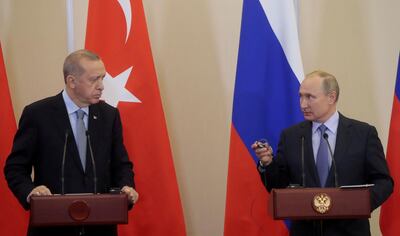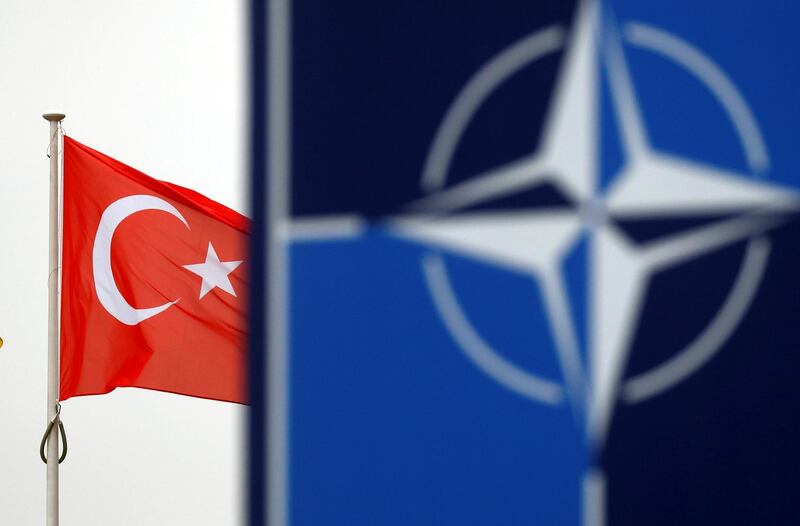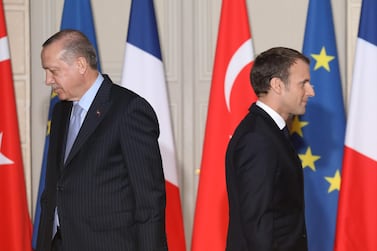Leaders of Nato states gathering at a country hotel outside London this week will confront a crisis centred on Turkey, which has become the alliance’s most troublesome member in recent years.
Turkey’s President, Recep Tayyip Erdogan, has threatened to veto plans for the defence of Poland, Lithuania, Latvia and Estonia unless the 29-member bloc provides more support for Turkish aims in Syria.
In particular, Ankara wants its Nato allies to formally declare the People’s Protection Units (YPG), a Syrian Kurdish militia with which the US allied to fight ISIS, a terrorist organisation.
The demand centres on the ties between the YPG and the Kurdistan Workers Party (PKK), which has waged a 35-year insurgency in Turkey that has caused tens of thousands of deaths.
The PKK is considered a terrorist group by the US, EU and Turkey.
In October, Ankara launched a military operation in north-east Syria to drive the YPG, which leads a US-backed coalition known as the Syrian Democratic Forces, away from its southern border.
Critics said the operation threatened efforts to stamp out the remaining ISIS elements in Syria.
Senators in Washington called for sanctions on Turkey and its suspension or expulsion from Nato. Other alliance members, including France, Germany and Norway, halted the sale of military equipment to Turkey.
At the same time, Ankara’s ties with Moscow are growing. They are co-operating in Syria even though Turkey opposes Russian ally Bashar Al Assad, and Mr Erdogan has bought Russian-made S-400 missiles.

Despite threats to sanction Turkey over the air defence system, which arrived in July and was tested last week, the only reaction from the West was Washington’s decision to remove Turkey from the multinational F-35 stealth fighter programme.
How Nato will handle Turkey’s demands is likely to be a core focus of the summit, which marks the alliance’s 70th anniversary.
“I think it’s a bluff that might work,” said Kamal Alam, a UK military analyst, of Ankara’s threat to veto the Baltic defence plan.
“Turkey now feels confident that its alliance with Russia, and to a lesser degree China, is such that they have the upper hand and Europe needs them more than they need Europe with regard to both Nato and non-Nato issues.”
Issues outside the alliance include the almost four million Syrian refugees hosted by Turkey.
Mr Erdogan has repeatedly said he would “open the gates” to Europe for the refugees, while seeking European funding to create a “safe zone” for them in north-east Syria.
Aykan Erdemir, a former Turkish opposition MP and senior fellow at the Foundation for Defence of Democracies in Washington, said Turkey’s relations with Nato were “becoming increasingly transactional".
"Erdogan’s tactic of playing a spoiler role within the alliance to extract concessions undermines trust between Ankara and its allies," Mr Erdemir said.
Turkey has long complained of US support for the YPG and says it was forced to buy Russia’s S-400s because the US would not offer a suitable deal for its Patriot missile system.
Turkey’s operation in Syria has widespread public support, with surveys showing about 80 per cent approval.
Because of the ties between the YPG and PKK, Turkey considers them to be essentially the same organisation.
“Nato made a decision that if any members come under terrorist attack, then all members will come together against that attack,” said Hursit Tolon, a retired commander of Turkey’s First Army.
“Turkey has been fighting for decades but has not seen this support. Whatever people say, the YPG is a terrorist organisation, therefore Turkey is doing the right thing.”
Mr Alam said Turkey’s move towards Russia was a result of Moscow’s willingness to listen to Ankara’s concerns in Syria.
“As we have seen in the Astana process, Russia and Turkey, despite their political differences over Assad, have worked together,” he said.
Turkey, Russia and Iran launched a Syrian peace plan in early 2017.
Turkey, which joined Nato in 1952, has the alliance’s second-largest military after the US and has successfully taken part in Nato missions in Afghanistan and the Balkans.
“Turkey is a loyal member of Nato and one of the biggest powers in Nato,” said Unal Atabay, who leads the Terrorism and Counter-Terrorism Research Centre in Ankara.
“It has fulfilled all its obligations so it has the right to ask Nato to support its interests on security.
"It’s important for the future of Nato that it does not act like an organisation that is ruled by just a few countries, but for all its members.”
Turkey’s disputes with other Nato members include renewed tension over gas drilling off Cyprus, for which the EU has put a sanctions framework in place, and Ankara’s reluctance to sever ties with Iran.
Ismail Pekin, a former head of Turkish military intelligence who is now a senior figure in the left-wing nationalist Vatan Party, predicted a breakthrough in the standoff with Nato.
“No country wants to be seen as the country that is harming the structure and operation of Nato," Mr Pekin said.
He defended the government’s dealings with Russia as a result of having no other alternatives.
“This doesn’t mean Turkey wants to leave Nato or is changing its path," Mr Pekin said.
But Mr Erdemir said the “ongoing pivot to Russia” would make Turkey’s relations with Nato deteriorate.
“In the short run, Nato member states could choose to appease Erdogan to prevent a crisis but in the mid-run, their patience is likely to run out,” he said.
Meanwhile, Mr Alam saw Turkey’s control of the Bosphorus Strait and influence in the Caucasus and Balkans as increasing the chances of some sort of agreement, although there “definitely won’t be cohesion on the Kurdish-YPG issue”.
“For good or for bad, they just can’t do without Turkey,” Mr Alam said. “Losing Turkey to Russia is a far bigger threat than having a nuisance, which is Turkey.”







